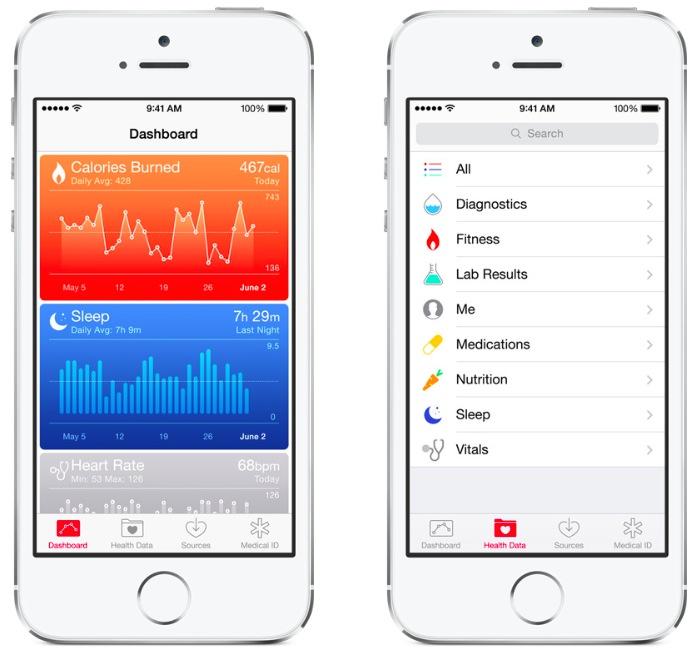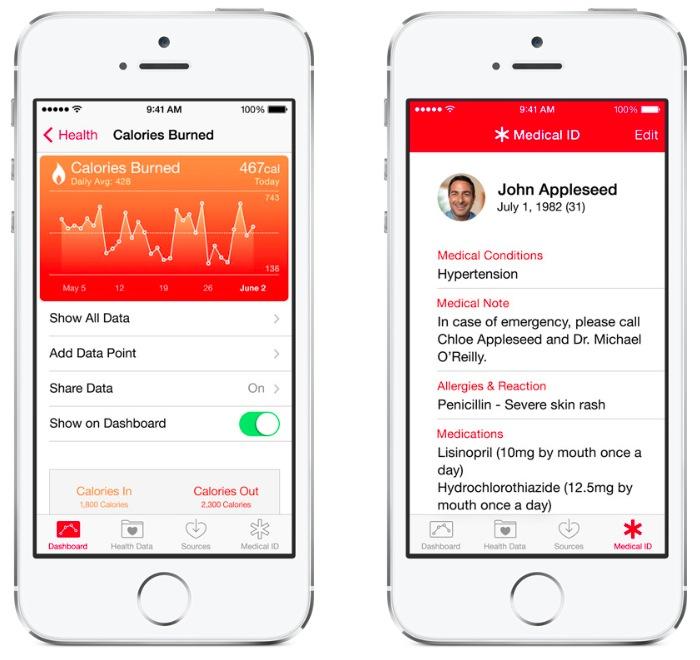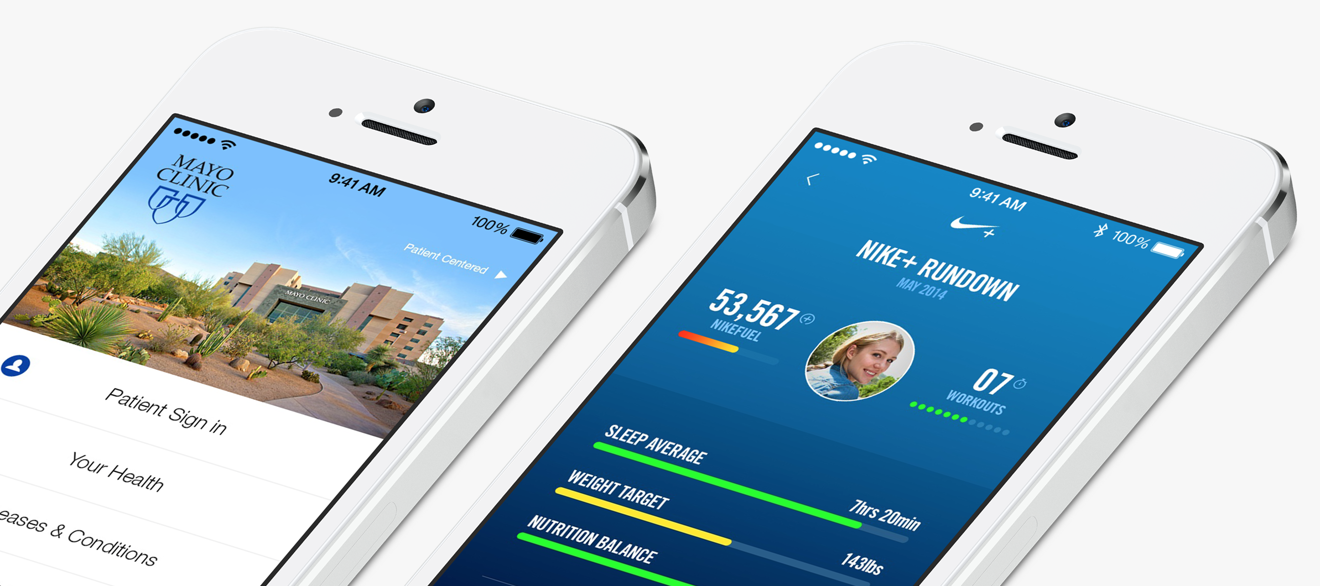Behind the apparently simple premise of Apple's new Health app in iOS 8 is the potential to "solve one of the single worst problems in healthcare today," wrote one healthcare professional: "the inability to easily transfer patient records from one care location to another."
Responding to a question on Quora asking "What do doctors think of HealthKit?" an Emergency Room doctor in training named Jae Won Joh shared a perspective that's since earned upvotes by scores of other doctors and healthcare workers.
"It has tremendous potential," Joh wrote. But that wasn't his first impression. "I watched the keynote last night, and initially Healthkit seemed fairly unremarkable, just another way for consumer apps like Nike+ and sleep trackers to output their data into pretty charts," he stated.
"A cursory look at their website (Apple - iOS 8 - Health) would seem to support the view that HealthKit is targeted at those obsessed with the 'quantified self' movement."iOS 8's new HealthKit "has tremendous potential"
Joh wasn't impressed with a idea of a system app designed to simply track and graph what he called "fitness-oriented data," such as calories burned, sleep and heart rate, the three dashboards visible in Apple's Health app screen shot (above left).
However, looking at the second "Health Data" screen (depicted by Apple in the above right image), Joh observed that "from a clinical perspective, there are 4 key points of interest, particularly since Epic Systems (one of the largest EMR vendors in the nation) was mentioned in the keynote."
He highlighted Diagnostics, Lab Results, Medications and Vitals, and also called attention to a third screenshot showing a Medical ID, with Medical Conditions, Notes, Allergies & Reactions, and Medications.
"Suddenly, I'm interested," he wrote.
"Imagine if with just your phone, you could travel with all of your former imaging studies (e.g. chest X-rays, CT scans). Your verified vaccination records. Your biopsy results. Your list of allergies. Your lab tests from the last 10, 15, 20 years. All the medications and doses you've ever been on, for what time period, and why. Your heart rate and blood pressure measurements from every clinic visit you've ever made. What if all of this was kept in the cloud, with instant access through your phone?" he wrote.
The onerous problem iOS 8 Health has the potential to solve
"Take a moment to see how medical records currently go from institution to institution," he wrote, linking to an outline he presented of the convoluted, archaic, problematic series of steps that hospitals and doctors currently struggle with.
"Facsimile.
"Yes, you read that correctly. In the 21st century, when the power of the internet can provide instant secure connectivity to transfer enormous quantities of data, U.S. hospitals pour millions and millions of dollars into EMRs that aren't compatible with each other, necessitating reliance on an ancient technology from the '60s unknown to the majority of human beings born in this country past 1995."
He then detailed the difficulty of getting information from patients, who might be unconscious, unable to communicate, or without the capacity to consent access to necessary information.
If the patient remembers where they were previous treated, the attending doctor is then tasked with looking up the institution, if it is even still in operation, and then fill out an extensive form by hand that the patient can sign to release access to their medical information.
Part of the consent process requires that the doctor "spend time explaining to the patient why access to prior records is necessary," and then "deal with patient reaction."
The attending physician then has to send, by fax, the written consent, ("If this step fails, try not to feel too much frustration that I spent over 2 decades studying to become a doctor only to be stalled by a piece of hardware that even my parents didn't own" he wrote) and then wait for hours for the other facility to find and return the patient's medical records.
After finally receiving a reply, Joh commented that that incoming fax is likely to be "a bundle of grainy scanned papers from other facility," which can't be electronically searched, resulting in the need to "search through the entire stack (sometimes hundreds of sheets, depending on patient's history) by hand to find what I need."
Scenarios solved by patient carried, Touch ID secured Electronic Medical Records
"This could be revolutionary," Joh noted, describing a couple scenarios where the technology behind HealthKit could both make life easier and even deliver life saving information.
In introducing HealthKit at WWDC, Apple's software chief Craig Federighi noted that The Mayo Clinic is working with Apple on a patient monitoring tool that ties into Health, so that when a patient takes a blood pressure measurement the data can be saved and checked against previous personal results. If a reading is abnormal, the data can be automatically sent to the patent's doctor for quick and seamless response.
Apple's discussions with the U.S. Food and Drug Administration indicated that Apple executives feel that mobile devices can do more to help people learn about themselves, and that they feel there "may be a moral obligation to do more."
Filings revealed by the agency stated that "Apple will work closely with the FDA as they develop future products," and that the company believes that "the earlier FDA is involved and advising, the less likely that Apple would be caught by surprise later when they wish to release a new product, if that product must be regulated."
That supports the idea that Apple is working to broaden the scope of iOS 8 Health to include more sophisticated EMR features for patient data. Along those lines, Joh described a situation where there is a hypothetical "lung cancer patient in New York who wants to move to Michigan to be closer with her extended family," who "now has significantly more peace of mind, knowing that her health data can easily move with her.
"She doesn't have to drudge through the paperwork to release her own medical records from her prior hospital system. She doesn't have to make a separate trip to the radiology department to have them burn her a CD/DVD of all of her imaging. She doesn't have to burden her new oncologist with the task of sifting through hundreds of sheets of results by hand, as she can release them into the new EMR with a single tap of a finger. She doesn't have to worry about whether the images on the disc will be compatible with her new radiologist's system, as the cloud automatically adjusts the data format to match."
In a second situation, Joh described a trauma patient "who arrives in a lower-acuity ER after a motor vehicle accident and is found to have a severe unstable ankle fracture on imaging." With that Xray data uploaded to the cloud as part of the patient's HealthKit medical record, he "can now be more easily transferred to a higher-level hospital with orthopedic surgery on call."
As a result: "no drudging through paperwork. No waiting to process a CD/DVD. Less hassle. More clinical care."
Joh concluded, "I feel that HealthKit might well be the first step in creating something akin to a universal EMR. If Apple pulls this off with the right partners," he observed, "they could potentially solve one of the single worst problems in healthcare today: the inability to easily transfer patient records from one care location to another."
Jon Steuernagle, an ICU doctor commenting on the subject added, "One of the most exciting breakthroughs in modern medicine. Getting your physical data, biometric data into the EMR and into your doctors hands. Just needs to be economically feasible for majority of people."
Apple's Health app is somewhat reminiscent of Passbook, the iOS 6 app Apple introduced to manage electronic tickets, boarding passes, coupons and other records. While many critics complained that they thought it wasn't interesting enough, virtually all online ticketing is now made available for Passbook. Apple's Passbook implementation was so brilliantly simple and functional that it has been directly adopted by other platforms, notably Microsoft's Windows Phone.
 Daniel Eran Dilger
Daniel Eran Dilger









-m.jpg)






 Christine McKee
Christine McKee
 Malcolm Owen
Malcolm Owen

 Charles Martin
Charles Martin


 Mike Wuerthele
Mike Wuerthele



-m.jpg)






46 Comments
Interesting. I sometimes wonder, though, why the large insurance companies didn't devise a product like this first. You KNOW they have every single record of yours going back decades, even if you've had to switch providers several times. It's in their financial interest to have the detail so they can find those fine points to dispute and not pay your claim, or rule that the expense was 'beyond customary' etc. All Insurers had to do was make this information available to the doctors and better (maybe even less expensive and redundant ) patient care would result. Could they have found a way to sell this back to doctors though? Maybe not. Well perhaps Apple can tie into their databases ( with patient permission) or maybe they will just do an end run around it. What about the specific database the insurers use to decide if they will offer Life Insurance and at what price. There is a hospital database that logs every time you have any major surgery. I had this explained to me years ago by an insurance agent, believe me, they have records like Equifax. Although the Affordable Healthcare Act has now restricted insurers from discriminating against you they still have those records I'm sure. All of this stampedes straight into privacy areas, however, in an emergency room that's one thing you probably don't want. It's amazing that ER physicians do as well as they do, being kept out of the loop of information that the Insurers already have. Please excuse my clumsy writing, I think better than I write.
I always suspected that Apple's health and medical thrust is going to go way beyond goosed up fitness monitors, what with Apple talking to the FDA, hiring all those high-powered med tech people, as well as a person who is supposed to be an expert in shepherding tech products through the FDA approval labyrinth (her last name is Nag, how appropriate). I even ventured that maybe they're thinking of taking a stab at fixing the Great Big Electronic Medical Records Mess with a platform that the smaller clinics can afford. Maybe that's not mere fantasy after all. Furthermore, especially with medical records, whom would you trust to keep your records safe and private? Google? Amazon? Microsoft? Maybe Microsoft but I still trust Apple more. If only because secrecy is so ingrained in its culture so they already have the mindset and the procedures that engender privacy protection.
Interesting. I sometimes wonder, though, why the large insurance companies didn't devise a product like this first. ...
Health records are a mess, just as this article points out, but it's more complicated than your post. Every institution has a different system and it doesn't talk to the others. And they don't want them too, as doctor comments could easily create liabilities and different software systems are fortresses to retain customers. The technology to achieve an EHR system is much simpler (though not simple) than the implications to policy, business and health and human impacts. While insurance companies are powerful, medical systems are too and they push back for their own interests (and thankfully as I don't want my insurance company to know my medical history!). As it is, these organizations interact via billing codes and contractual agreements around these codes.
Obamacare has many provisions in it that have been asked for from the medical community for decades and it will improve things over time. It's all big and complicated so nothing will move quickly or perfectly, but it is progressing.
Look up "Meaningful Use" to get an idea about the direction of electronic medical records.
Interesting. I sometimes wonder, though, why the large insurance companies didn't devise a product like this first. You KNOW they have every single record of yours going back decades, even if you've had to switch providers several times. It's in their financial interest to have the detail so they can find those fine points to dispute and not pay your claim, or rule that the expense was 'beyond customary' etc.
All Insurers had to do was make this information available to the doctors and better (maybe even less expensive and redundant ) patient care would result. Could they have found a way to sell this back to doctors though? Maybe not.
Well perhaps Apple can tie into their databases ( with patient permission) or maybe they will just do an end run around it.
What about the specific database the insurers use to decide if they will offer Life Insurance and at what price. There is a hospital database that logs every time you have any major surgery. I had this explained to me years ago by an insurance agent, believe me, they have records like Equifax. Although the Affordable Healthcare Act has now restricted insurers from discriminating against you they still have those records I'm sure.
All of this stampedes straight into privacy areas, however, in an emergency room that's one thing you probably don't want. It's amazing that ER physicians do as well as they do, being kept out of the loop of information that the Insurers already have.
Please excuse my clumsy writing, I think better than I write.
Most of what you want in the ER is lost in what the Insurance company has. ER staff want your data[in about 10 minutes], not your diagnosis/procedural Hx. The want your last Angiogram report, and ideally your EKG image, your
Insurance companies DON'T want that data (Images, Labs, diagnostic reports) sent to them by the medical orgs, because it's not business necessary and therefore a security/privacy risk.
They do however, want you to enter it. (and most have EHR apps for that, and have it set up to get MDs usernames/passwords to enter into your record on your behalf).
They do have your meds, and diagnostics, but they don't have the details, your family history, and that combination is getting close to pre-PreExisting Conditions [you're getting Pap Smears annually, and your mother had early onset cervical cancer.... maybe we should raise your rates because you're likely to get uterine/cervical cancer... because... you're doctor thinks so]
There is a clearinghouse for all prescriptions and insurance data that for a fee, you can query and determine their 'current risk.' It's illegal for you to pull an individuals record (it's supposed to be anonymous... for use in pool rating information [the common use is a big employer giving an insurance company their employee list [ssns] and get a 'cost of care' [most large business self insure] scenario for the next 1-3 years for them to adjust particular benefits payoffs to fit their benefits budget]... but you can run the test twice once with the person, once without in a pool of 'control data' and see how the results skew on the inclusion of an individual.
Insurance companies DO have some of your X-rays and lab records. Yes doctors still use pen and paper to 'push back' against insurers, their comments are your private records. But Diagnoses, tests, images go to insurance oftentimes. At least they used to, which I know from personally disputing a claim. They are in the business of second guessing the doctors. The billing codes are a common language that cuts across the mess of health records from different doctors and hospitals. Those billing codes are quite specific, they ARE your medical history, minus, of course, your doctor's private notes. In other words, your insurer does have your health history indeed. Like I said, they are like Equifax, they aggregate info from everywhere. If you apply today for a big life insurance policy you can believe the insurer will check that hospital database, and will see that for example, you omitted the fact that you have stage 3 cancer in your left cheekbone and went for surgery. It used to be the same for healthcare policies. Insurance is an industry I have a hard time finding a rationale for (outside of fire insurance and basic term life maybe). Kind of like stock analysts, they don't add anything positive. They *could* be used for good if they hooked their back end database into Apple's kit ( with privacy permission). But then, somebody would have to pay somebody, which is what I find despicable about the whole system. :\